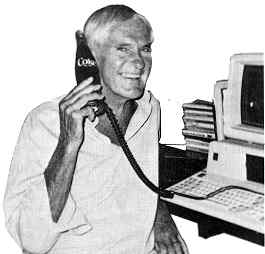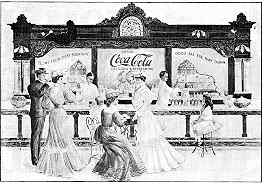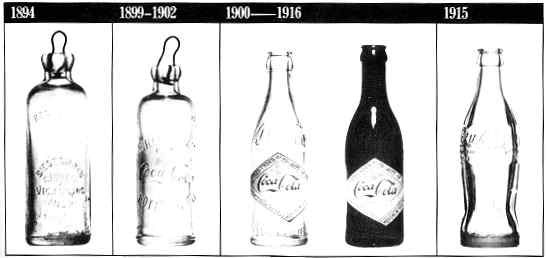COMPUTERS/
PERSONAL
FREEDOM
by Timothy Leary
Timothy Leary is the author of Flashbacks and the interactive personality program SKIPI.
Once upon a time, knowledge-information was stored in extremely expensive mainfame systems called Illuminated Volumes, usually Bibles, carefully guarded in the palace of the Duke or Bishop and accessible only to security-cleared, socially alienated hackers called Monks. Then in 1456 Johann Gutenberg invented a most important piece of hardware: the movable-type printing press. This knowledge-information processing system could mass-produce inexpensive, portable software readily available for home use. The Personal Book.
Until recently, computers were in much the same sociopolitical situation as the pre-Gutenberg systems. The mainframe knowledge-processors that ran society were the monopoly of governments and large corporations. They were carefully guarded by priestly technicians with security clearances. The average person, suddenly thrust into electronic illiteracy and digital helplessness, was understandably threatened.
The Mainframe Monopoly
My first contact with computers came in 1950, when I was director of a Kaiser Foundation psychological research project that developed mathematical profiles for the interpersonal assessment of personality. In line with the principles of humanistic psychology, the aim of this research was to free persons from dependency upon doctors, professionals, institutions and diagnostic-thematic interpretations. To this end, we elicited clusters of yes-no responses from subjects and fed back knowledge in the form of profiles and indices to the patients themselves.

Personal telecommunications: Timothy Leary
with a CocaCola bottle telephone
and an IBM PC.
Relying on binary information rather than thematic interpretation, our research was ideally suited to computer analysis. Routinely we sent stacks of data to the Kaiser Foundation's computer room, where mysterious technicians converted our numbers into relevant indices. Computers were thus helpful, but distant and unapproachable. I distrusted the mainframes because I saw them as devices that would merely increase the dependence of individuals upon experts.
In 1960 I became director of the Harvard Psychedelic Drug Research program. The aims of this project were also humanistic: to teach individuals how to self-administer psychoactive drugs in order to free their psyches without reliance upon doctors or institutions. Again we used mainframes to index responses to questionnaires about drug experiences, but I saw no way for this awesome knowledge power to be put in the hands of individuals. I know now that our research with psychedelic drugs and, in fact, the drug culture itself was a forecast of or preparation for the personal computer age. Indeed, it was a brilliant LSD researcher, John Lilly, who in 1972 wrote the seminal monograph on the brain as knowledge-information processing system: Programming and Meta-Programming in the Human Bio-Computer. Psychedelic drugs expose one to the raw experience of brain function, with the protections of the mind temporarily suspended. We are talking here about the tremendous acceleration of images, the crumbling of analogic perceptions into vapor trails of neuron off/on flashes, the multiplication of mind programs slipping in and out of awareness like floppy disks.
The seven million Americans who experienced the awesome potentialities of the brain via LSD certainly paved the way for the computer society. It is no accident that the term "LSD" was used twice in Time magazine's cover story about Steve Jobs. For it was Jobs and his fellow Gutenberger, Stephen Wozniak, who hooked up the personal brain with the personal computer and thus made possible a new culture.
Hands On/Tune In
The development of the personal computer was a step of Gutenberg magnitude. Just as the Personal Book transformed human society from the muscular-feudal to the mechanical-industrial, so has the personal electronic knowledge processor equipped the individual to survive and evolve in the age of information. To guide us in this confusing and scary transition, it is most useful to look back and see what happened during the Gutenberg mutation. Religion was the unifying force that held feudal society together. It was natural, therefore, that the first personal books would be Bibles. When the religion market was satiated, many entrepreneurs wondered what other conceivable use could be made of this new-fangled software. How-toread books were the next phase. Then came game books. It is amusing to note that the second book printed in the English language was on chess-a game that became, with its knights and bishops and kings and queens, the Pac-Man of late feudalism. We can see this same pattern repeating during the current transition. Since money/business is the unifying force of the industrial age, the first Wozniak bibles were, naturally enough, accounting spreadsheets. Then came word processors. And games.
The history of human evolution is the record of technological innovation. Expensive machinery requiring large group efforts for operation generally becomes a tool of social repression by the state. The tower clock. The galley ship. The cannon. The tank. Instruments that can be owned and operated by individuals inevitably produce democratic revolutions. The bronze dagger. The crossbow. The pocket watch. The automobile as self-mover. This is the liberating "hands-on" concept. Power to the people means personal technology available to the individual.

In viewing the home computer movement, I am often reminded of a homely parable from America's cultural past. Some three-score years ago, the most popular soft drink in the land was derived from coca leaves and cola nuts. A magnificent ritual accompanied the distribution of this sparkling energizer. Place: the soda fountain. Mainframe technology: a large, gleaming steel tank filled with syrup and connected to a stainless-steel pipe from which bubbled phosphorus water. A white-coated priest pulled the handle, and the elixir was mixed before the very eyes of the dazzled consumer.
One day a mysterious gentleman called on the president of the soft drink company and handed him a small white envelope. "This contains two words that will revolutionize your business and multipy your profits," said the visitor. With trembling hands, the executive extracted the paper from the envelope and read the two words: BOTTLE IT.
Who could have foreseen the enormous cultural consequences of the personal bottle? The basic issue: "hands-on" replaced the priestly, white-coated attendant. The personal bottle replaced the fountain shrine. Power to the individual! It was no accident that CocaCola instantly spread around the world as a symbol of American egalitarianism. Everyone likes the "pause that refreshes." The addiction, by the way, is not to the stimulant or the sugar, but to the freedom of choice. The slogan "Coke Is It!" really refers to the individual option provided by the hands-on technology.
Evolution/ Revolution
Nothing less than a new symbiotic partnership is developing between human brains and computers. In evolving to more physiological complexity, our bodies formed symbioses with armies of digestive bacteria necessary for survival. In similar fashion, our brains are forming neural-electronic symbiotic link-ups with solid-state computers. It is useful to distinguish here between addictions and symbiotic partnerships. The body can become passively addicted to certain molecules, e.g., of heroin, and the brain can become passively addicted to electronic signals, e.g., from television. The human body, as we have noted, also requires symbiotic partnerships with certain unicellular organisms. At this point in human evolution, more and more people are developing mutually dependent, interactive relationships with their microsystems. When this happens, there comes a moment when the individual is "hooked" and cannot imagine living without the continual interchange of electronic signals between the personal brain and the personal computer. There are interesting political implications. In the near future, over twenty million Americans will have established intense interactive partnerships with their computers. These individuals will operate at a level of intelligence that is qualitatively different from those who use static forms of knowledge-information processing. In America this difference is already producing a generation gap, i.e., a species gap. After Gutenberg, personal books created a new level of individual thinking that revolutionized society. An even more dramatic mutation in individual intelligence will occur as the new species grows up linked symbiotically with personal information processing systems.
Childhood's End?
It seems clear that we are facing one of those genetic crossroads that have occurred so frequently in the history of primates. The members of the human gene-pool who form symbiotic links with solid-state computers will be characterized by extremely high individual intelligence and will settle in geographic niches that encourage individual access to knowledge-information processing software.
New associations of individuals linked to computers will surely emerge. Information nets will encourage a swift, free interchange among individuals. Feedback peripherals will dramatically expand the mode of exchange from keyboard punching to neuro-physiological interaction. The key word is, of course, "interaction." The intoxicating power of interactive software is that it eliminates dependence on the enormous bureaucracy of knowledge professionals that flourished in the industrial age. In the factory culture, guilds and unions and associations of knowledge-workers jealously monopolized the flow of information. Educators, teachers, professors, consultants, psychotherapists, librarians, managers, journalists, editors, writers, labor unions, medical groups-all are now threatened.
It is not an exaggeration to speculate about the development of very different postindustrial societies. Solid-state literacy will be almost universal in America and the other Western democracies. The rest of the world, especially the totalitarian countries, will be kept electronically illiterate by their rulers. At least half the United Nations' members now prohibit or limit personal possession. And, as the implications of home computers become more clearly understood, restrictive laws will become more apparent.
In his chilling song "Life During Wartime," David Byrne of the Talking Heads wails about the day when "We got computers ... I know that that ain't allowed." If we are to stay free, we must see to it that the right to bear computers becomes as inalienable as the constitutional guarantees of free speech and a free press.

Return to Table of Contents | Previous Article | Next Article

